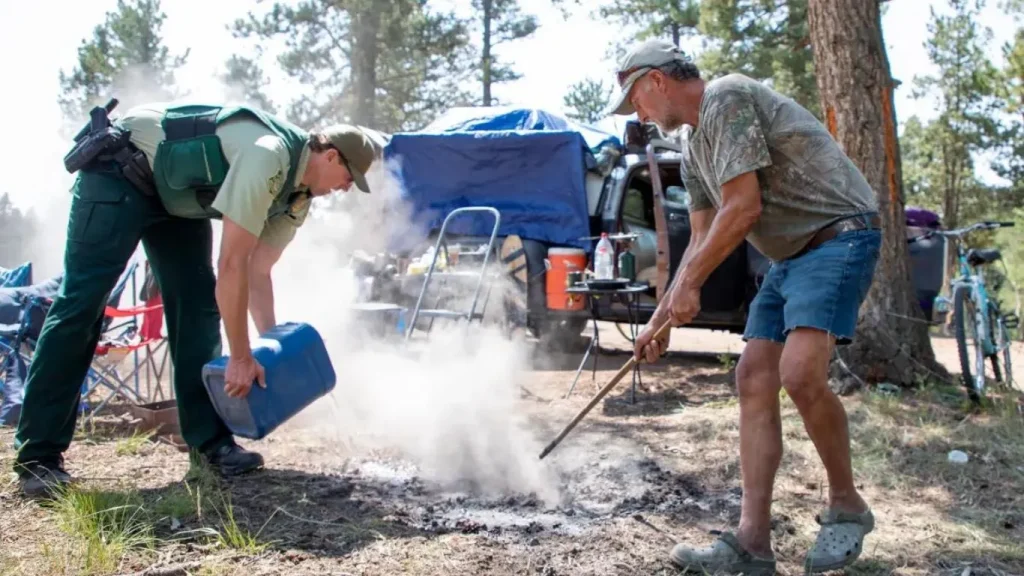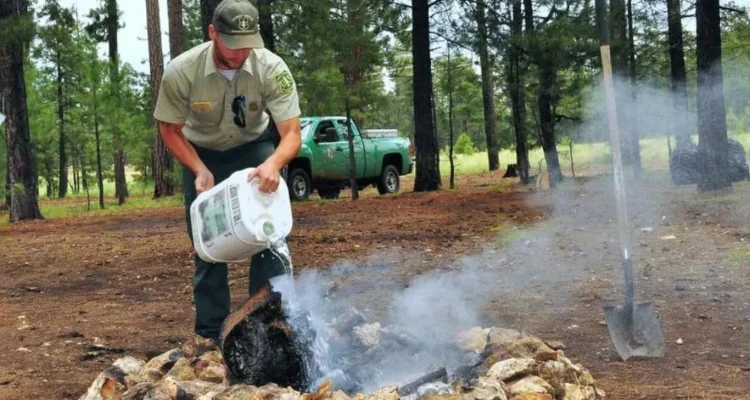Fire pits are wonderful additions to any outdoor space, providing warmth and ambiance. However, it’s crucial to know how to safely extinguish a fire pit to prevent accidents and ensure longevity. Here’s a step-by-step guide on how to properly put out a fire pit.

Understanding Fire Pit Safety
Before delving into the extinguishing process, it’s essential to understand the types of fire pits and the fuels they use. Different fire pit designs require different safety precautions, and knowing your fire pit type ensures you handle it safely.
Different Types of Fire Pits and Their Safety Considerations
Fire pits can be wood-burning, gas-powered, or even gel-fueled. Each type requires specific safety measures due to differences in fuel combustion and heat distribution.
Common Fuels Used in Fire Pits
Wood, propane, natural gas, and gel are common fuels for fire pits. Each fuel type has its ignition and extinguishing requirements, influencing how you manage the fire.
Tools and Equipment You’ll Need
Before starting a fire pit, gather essential tools and safety gear to handle the fire and potential emergencies effectively.
Essential Tools for Managing a Fire Pit
Tools like fire pokers, tongs, and heat-resistant gloves are crucial for managing flames and ensuring safety during extinguishing.
Safety Gear Required for Handling Fire
Wearing protective gear such as goggles and heat-resistant clothing shields you from heat and sparks while managing the fire.
Step-by-Step Guide to Putting Out a Fire Pit
Follow these steps to safely extinguish your fire pit and prevent flare-ups after use.
Step 1: Reduce the Flame Intensity
Allow the firewood or gas to burn down naturally. Avoid adding more fuel at this stage to reduce the flames gradually.
Step 2: Sprinkling Water or Using a Fire Extinguisher
For wood-burning fire pits, sprinkle water over the flames using a bucket or hose. For gas or gel-fueled pits, turn off the gas supply or snuff out the gel canister.
Step 3: Stirring and Checking for Hot Spots
After extinguishing the flames, use a poker or shovel to stir the ashes and embers. Check for any remaining hot spots that could reignite the fire.
Step 4: Ensuring the Fire is Completely Extinguished
Continue stirring and adding more water if needed until all embers are cool to the touch. This step ensures the fire is fully out and safe to leave unattended.
Post-Extinguishing Care
Once the fire pit is cool, follow these steps to maintain cleanliness and safety for future use.
Cleaning up the Fire Pit Area
Remove ashes and debris from the fire pit using a shovel or ash scoop. Dispose of ashes in a metal container designated for ash disposal.
Safe Disposal of Ashes and Debris
Wait at least 24 hours before disposing of ashes to ensure they are completely cold. Store ashes in a fireproof container away from flammable materials.
Common Mistakes to Avoid
Understanding common mistakes can help you avoid accidents and ensure safe fire pit use.
Neglecting to Monitor the Fire Pit
Leaving a fire pit unattended increases the risk of accidental fires and injuries. Always monitor the fire until fully extinguished.
Using Improper Extinguishing Methods
Using water on grease fires or incorrect extinguishers can worsen the fire. Use appropriate methods for your fire pit type.
Safety Tips for Using Fire Pits
Implementing safety measures ensures enjoyable and safe experiences around your fire pit.
Positioning the Fire Pit Safely
Place the fire pit on a non-flammable surface, away from overhanging branches or flammable structures.
Guidelines for Fueling the Fire Pit Safely
Follow manufacturer instructions for fueling and lighting your fire pit to prevent accidents and ensure proper combustion.
Benefits of Proper Fire Pit Maintenance
Maintaining your fire pit enhances safety and extends its lifespan for continued enjoyment.
Extending the Life of Your Fire Pit
Regular cleaning and maintenance prevent rust and deterioration, prolonging the fire pit’s usefulness.
Ensuring Safety for Future Use
Properly extinguishing fires and maintaining equipment reduces the risk of accidents and ensures a safe environment for all.
FAQs about Putting Out a Fire Pit
What should I do if I can’t find a fire extinguisher?
If a fire extinguisher isn’t available, use water carefully to extinguish the fire, ensuring it’s completely out before leaving.
Can I use sand instead of water to put out the fire?
Sand is effective for small fires and can smother flames by cutting off oxygen. However, water is generally more effective for fire pit extinguishing.
How often should I clean my fire pit?
Clean your fire pit after every use to prevent ash buildup and maintain its functionality and safety.
Is it safe to leave a fire pit unattended after extinguishing?
Never leave a fire pit unattended until it’s completely cool and all embers are extinguished to prevent accidental fires.
What should I do if the fire reignites after I’ve put it out?
If the fire reignites, repeat the extinguishing process using water or appropriate extinguishing methods until fully extinguished.
Conclusion
Safely extinguishing a fire pit is essential for preventing accidents and maintaining its longevity. By following these steps and safety tips, you can enjoy your fire pit responsibly and safely.


Congratulation!